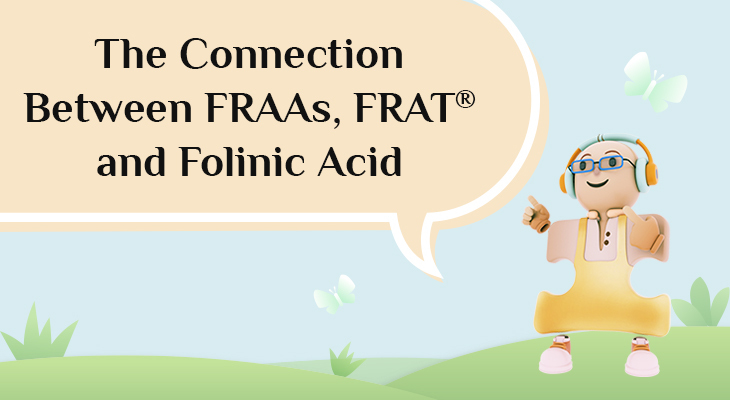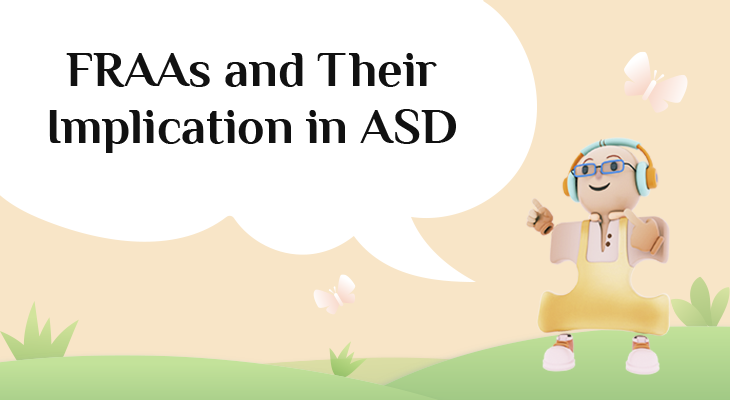
Folate Receptor Autoantibodies (FRAAs)
Folate receptor autoantibodies (FRAAs) represent a groundbreaking discovery in neurodevelopmental and neuropsychiatric medicine. These autoantibodies target the folate receptor alpha (FRα), a critical protein responsible for transporting folate (vitamin B9) across the blood-brain barrier and into various tissues throughout the body. When these autoantibodies are present, they interfere with folate transport, potentially leading to cerebral folate deficiency (CFD) despite normal systemic folate levels.
The clinical implications of FRAAs are profound, with research linking them to:
- Autism Spectrum Disorders (ASD)
- Cerebral Folate Deficiency Syndrome
- Pediatric Autoimmune Neuropsychiatric Disorders Associated with Streptococcal Infections (PANDAS)
- Pediatric Acute-Onset Neuropsychiatric Syndrome (PANS)
- Depression and other mood disorders
- Schizophrenia
- Neural Tube Defects (NTDs)
Approximately 70-75% of children with ASD have been found to have these autoantibodies in numerous studies, suggesting a significant subgroup that may benefit from targeted treatment. The prevalence in PANS/PANDAS populations is similarly high at about 63.8% 3.
Understanding the FRAT® Test: Detection and Diagnosis
The Folate Receptor Autoantibody Test (FRAT®) is a specialized blood test designed to detect and quantify these problematic autoantibodies. This test represents a significant advancement over traditional diagnostic methods, which often required invasive lumbar punctures to measure cerebrospinal fluid (CSF) folate levels.
Key Features of the FRAT® Test:
- Dual Assay System: The test measures two distinct types of autoantibodies:
- Blocking autoantibodies: These directly prevent folate from binding to the FRα receptor
- Binding autoantibodies: These alter the receptor’s configuration, impairing its function and causing an inflammatory response
- Clinical Utility: The test helps identify patients who may benefit from alternative folate therapies, particularly those with:
- Unexplained neurodevelopmental delays
- Treatment-resistant neuropsychiatric symptoms
- ASD with poor response to conventional therapies
- Testing Protocol:
- Requires a simple blood draw (1-4 mL of serum)
- No fasting required
- Patients should discontinue folinic acid or 5-MTHF supplements 48 hours prior to testing
- Results typically available in 2-4 weeks, which includes results for both blocking and binding autoantibodies
- Interpretation: Results are categorized with titer levels for each autoantibody type, guiding treatment decisions.
The correlation between serum FRAA levels and CSF folate concentrations has been validated in some previous studies, supporting the use of this less invasive testing method.
The Science Behind Folate Transport Disruption
To understand the clinical impact of FRAAs, it’s essential to grasp the normal folate transport mechanisms and how autoantibodies disrupt them:
Normal Folate Physiology
-
- Folate Receptors: The body utilizes several folate transport systems:
- Folate Receptor Alpha (FRα): High-affinity transporter active at low folate concentrations, primary transporter at blood-brain barrier
- Reduced Folate Carrier (RFC): Lower affinity, bidirectional transporter active at higher folate concentrations
- Proton-Coupled Folate Transporter (PCFT): Important for intestinal absorption
- Brain Folate Transport: FRα on choroid plexus epithelial cells mediates folate transport into CSF through an endocytosis mechanism. This process is ATP-dependent and crucial for maintaining adequate 5-methyltetrahydrofolate (5-MTHF) levels in the central nervous system.
- Folate Receptors: The body utilizes several folate transport systems:
Autoantibody Mechanisms
FRAAs disrupt this delicate system through two primary mechanisms:
- Blocking Antibodies: Bind directly to the folate binding site on FRα, physically preventing folate attachment
- Binding Antibodies: Attach to other regions of FRα, causing conformational changes that impair receptor function or promote its degradation
This disruption leads to cerebral folate deficiency despite normal blood folate levels, creating a unique metabolic scenario where the brain is starved of this critical nutrient while the rest of the body has adequate supplies.
Clinical Manifestations of Folate Receptor Autoimmunity
The clinical presentation of FRAA-related disorders varies widely but often includes many neurodevelopmental symptoms, such as:
- Speech and language impairments (from delayed speech to complete mutism)
- Social communication difficulties
- Stereotyped behaviors
- Cognitive impairment
- Developmental regression
It also presents itself with other neurological symptoms, such as:
- Seizures
- Movement disorders (ataxia, dyskinesia)
- Sleep disturbances
- Hypotonia
- Visual disturbances 47
Additionally, other psychiatric symptoms may include:
- Anxiety
- Depression
- OCD-like behaviors
- Psychosis (in severe cases)
In PANS/PANDAS patients, the presence of FRAAs was particularly associated with more severe tics. ASD patients with FRAAs often show a distinct symptom profile that may respond differently to conventional therapies.
Folinic Acid Treatment: Mechanism and Protocol
For patients testing positive on the FRAT® test, folinic acid (leucovorin calcium) has emerged as a promising treatment option. Unlike folic acid, folinic acid is a reduced, bioactive form of folate that can bypass the blocked FRα system by utilizing alternative transport mechanisms.
Why Folinic Acid Works:
- Alternative Transport: Can utilize the Reduced Folate Carrier (RFC) system, which isn’t affected by FRα autoantibodies
- Blood-Brain Barrier Penetration: Effectively crosses into the CNS even with FRα dysfunction
- Bioavailability: Doesn’t require complex activation steps like folic acid
- Safety Profile: Generally well-tolerated with minimal side effects
Although NOT approved by the FDA to be used for children with Autism or other neurodevelopmental, neuropsychiatric disorder, some physicians have been prescribing it off label. Please visit this informational piece for further information.
https://www.cbsnews.com/news/autism-leucovorin-medicine-folic-acid/
Treatment Protocol:
Typically, physicians using folinic acid off label acid have been generally adhering to the following:
- Dosing:
- Typical range: 0.5-2 mg/kg/day (max 50 mg/day)
- Some cases benefit from higher doses (up to 5 mg/kg/day)
- Often administered in split doses (e.g., twice daily)
- Formulations:
- Pharmaceutical grade leucovorin (tablets that can be crushed)
- Compounded liquid preparations for those who can’t swallow pills
- Over-the-counter folinic acid supplements (lower potency)
- Monitoring:
- Clinical response should be evaluated after 3-6 months
- FRAT® can be repeated to monitor autoantibody levels
- Adjust dose based on response and side effects
This protocol has generally been adhered to based upon previous scientific literature and experience in treating children with ASD. Again, this is NOT FDA approved, and physician guidance and consultation is required, as it is being used as off-label.
Clinical Evidence Supporting Folinic Acid Treatment
Multiple studies have demonstrated the efficacy of folinic acid in FRAA-positive individuals:
ASD Studies:
- A randomized controlled trial showed significant improvement in verbal communication, particularly in FRAA-positive children
- Open-label studies reported improvements in language, social interaction, attention, and behavior in about one-third of treated children
- Improvements often seen in core ASD symptoms like eye contact, social initiation, and repetitive behaviors
For further information on scientific literature, please visit https://www.fratnow.com/publication.php
Beyond Autism, there have been some interesting findings in PANS/PANDAS.
- Case reports describe symptom improvement in FRAA-positive patients
- May complement standard antimicrobial and immunomodulatory therapies
The use of FRAT® has opened up a new paradigm of assessing folate transport, especially in those with neurodevelopmental and neuropsychiatric disorders. Some general observations have been:
- Earlier treatment initiation correlates with better outcomes
- Children with both blocking and binding antibodies may require higher doses
- Effects typically become noticeable within weeks to months
Comprehensive Treatment Approach
While folinic acid is central to managing FRAA-related disorders, optimal outcomes often require a multifaceted approach:
- Dietary Modifications:
- Dairy Elimination: Milk proteins may stimulate FRAA production. Strict avoidance of all animal milk (cow, goat, sheep) is recommended
- Cofactor Supplementation:
- Vitamin D: May upregulate alternative folate transporters (RFC). Optimal levels: 60-80 ng/mL 7
- Methylcobalamin (B12): Works synergistically with folate in methylation cycles
- Pyrroloquinoline Quinone (PQQ): May enhance RFC expression
- Adjunctive Therapies:
- Speech and occupational therapy
- Behavioral interventions
- Treatment of comorbid conditions
- Monitoring and Follow-up:
- Regular clinical assessments
- Periodic FRAT® testing to monitor autoantibody levels
While the FRAT® test and folinic acid treatment represent significant advances, several areas require further exploration:
- Standardization: Developing consensus guidelines for testing and treatment protocols
- Long-term Outcomes: More data on extended treatment effects into adulthood
- Combination Therapies: Optimizing adjunctive treatments (immunomodulation, diet are examples)
- Prevention Strategies: Potential for early screening and intervention; this is critical
- Basic Mechanisms: Further elucidation of autoantibody triggers and propagation
Ongoing research continues to refine our understanding of folate receptor autoimmunity and its management, offering hope for improved outcomes in affected individuals.
Conclusion
The discovery of folate receptor autoantibodies and the development of the FRAT® test have revolutionized our approach to several neurodevelopmental and neuropsychiatric conditions. By identifying this specific pathophysiology, clinicians can now offer targeted treatment with folinic acid to a substantial subgroup of patients who may have previously been treatment-resistant.
The clinical evidence, while still evolving, strongly supports the utility of this approach, particularly in ASD and related disorders. With proper identification through FRAT® testing and appropriate folinic acid treatment, many patients experience improvements in communication, behavior, and overall functioning that can be truly transformative.
As awareness grows and research advances, this paradigm of testing and targeted treatment promises to benefit an increasing number of individuals affected by folate transport disorders, offering new hope where conventional therapies have fallen short!



